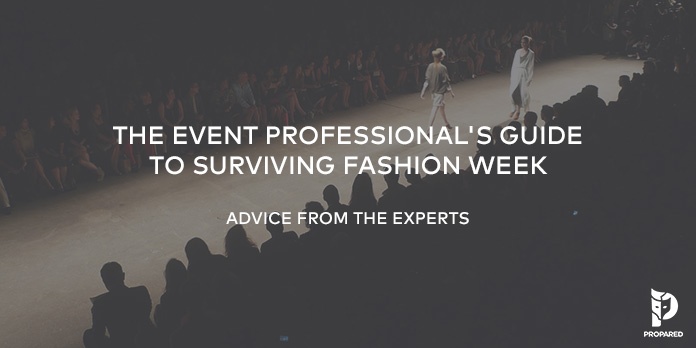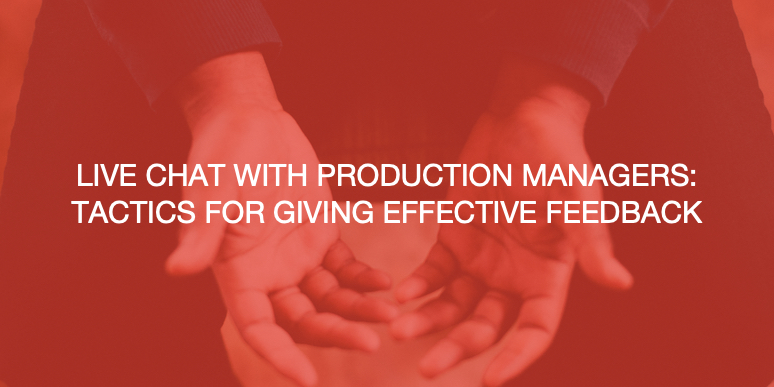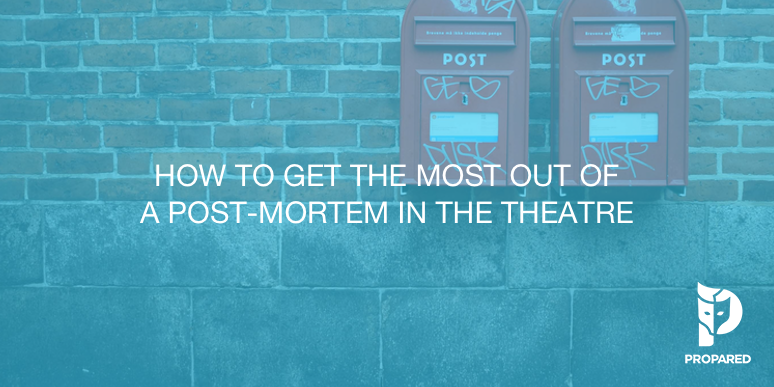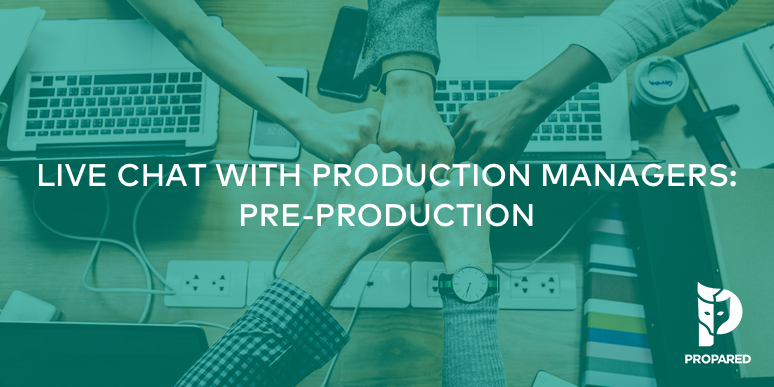
New York Fashion Week is here again! That wonderful time of year when the world’s preeminent designers gather to showcase their collections, establish new trends, and push the industry creatively (and financially) forward.
Over the years, Fashion Week has become more than just a handful of runway shows. There are literally hundreds of official and “off-site” events, parties, industry gatherings, experiential marketing installations, you name it. Just take a look at this really cool gif from the folks at Vocativ to see just how big New York Fashion Week has grown.

All these events mean A LOT of work. For event planners, yes, but even more for the technicians and event production crews. On an average day, there are far more technicians available to work than there are calls. Once Fashion Week comes around? You’d be hard pressed to find anyone with time on his or her hands. On the surface, this seems like a great thing, right? So much work means more money and more connections. Not so fast. While the benefits are great, they’re not without serious implications. We spoke to dozens of veteran event managers and techs who offered up some advice for anyone wanting to dive into the crazy awesome world that is Fashion.
On Preparation
During fashion week it wouldn’t be difficult to book yourself to work 24 hours a day for 7-10 straight days. That’s insane. Plan for endurance, not speed. Here’s what the pros have to say.
- “Don’t overbook yourself. You need to learn your limits before you book yourself for back to back calls.”
- “I can’t believe it took me 10 seasons to figure out batch cooking, but if you don’t want to spend a quarter of your take home (money) at Chelsea Market, spend a full day making and freezing your food for the weeks ahead.“
- “Always have a backup bag of Oreos.”
- “Make sure to incorporate a laundry day in your schedule before fashion week starts.”
- “Build a packing list: fresh pair of socks, a big refillable water bottle, and a healthy snack that won’t go bad (think trail mix). You never know when you’ll be burning a lunch break.”
- “Keep extra socks and shirts and deodorant on you at all times. Invest in rechargeable batteries. Eat more vegetables and fruit than bacon, egg, and cheeses. Drink more water than you think you need.”
On Differences and Design
We’re big advocates of event professionals moving between different kinds of work; theatre, corporate, meetings, music, etc. That said, our interviewees pointed out some of the intricacies of fashion work.
- “Corporate gigs change last minute fairly consistently but clients are more accepting of limits (limits being I can do it fast, well, or cheap. Pick two.) Theater folks don’t do too many last minute changes. Fashion clients have trouble understanding these limits and don’t deal as regularly with the physics of production realities. So you explain a lot more to them all the time.”
- “Looking at just the design side of things, fashion shows are first and foremost for the camera, whereas corporate and theatre seldom are. In your everyday corporate gig, it might not matter if you have a light with a slightly different color temperature, or the seam between two fixtures is slightly noticeable. But on a fashion show for a big named designer, that is of the utmost importance.”
- “It can be easy to lose sight of this (specificity in design), but when you are up on a ladder minutely adjusting the hanging position of 45 lekos in a row it’s not because the LD is being a picky jerk. The most important view is from the press riser. If it looks bad from that position then it will look bad on camera and it will look bad any of the thousands of places those photos might be printed.”
On-Site
It’s no accident that event planning was recently named one of the most stressful professions. That stress is magnified at Fashion Week. Each 5-10 minute show represents potentially millions of dollars in sales for the designers. Pressure trickles down to everyone working the show. A lot of frantic people make understandably emotional decisions and the crew often bears the brunt of the stress. Here’s what our experts suggest for working around it.
- “It’s typical to be loading in at the same time with all the other departments which can make your work space cramped and loud. Be considerate to the other departments and they will be more likely to be considerate to you (which will probably work in your favor come time for load-out).”
- “Know your knots.”
- “If you are new on a crew and inexperienced in fashion, push the boxes like you are told. Don’t be afraid to ask questions but actually listen to the answers and understand that there is never enough time to answer.”
- “Don’t rush, be respectful of everyone on every crew, and if you don’t know how to perform an aspect of a task, ask for guidance and/or a partner.”
- “If you make a mistake, own it.”
- “Keep a sense of humor. Often, that’s really the thing that will get you and your fellow crew members through the really stupid stuff/hours/people.”
- “Be willing to do what you are asked but if you do not have the experience to do it correctly, say so. Asking for help is much better than going back to fix something. Someone will always help you and then you can learn how to do it right. Let their snarky comments go by the wayside.”
- “If someone snaps at you, just remember they are probably tired and didn’t mean it (even if they don’t apologize). Also, you might have taken it the wrong way because YOU are tired and didn’t mean it.”
- “Small mouth. big ears.”
- “Don’t book gig while you’re on the clock, that’s what breaks are for.”
- “Listen and look around. If you don’t think there’s anything to do, or there are too many people on a project, see what else can be done. Don’t be a useless extra hand.”
On Safety and Equipment
You’ll be working alongside people who, like you, are overworked, underfed, and overtired. The perfect recipe for an accident or at the very least, some careless errors in handling expensive gear. Take a few extra moments to ensure you’re still following the proper safety procedures. Our veterans have seen their fair share of accidents and near-misses and recommended the following.
- “The later in the week, and the more tired you get, the more you need to think through everything you do to make sure it’s safe. Don’t rush to where you make bad decisions and put yourself or your crew at risk.”
- “No, you shouldn’t operate that circular or reciprocating saw blade/heavy equipment if you haven’t slept in the last 20 hours. And that’s OK! Someone else on site will have enough sleep logged to do it. If you have a supervisor who either A. gets mad at you for saying no when it’s a health and safety issue, or B. doesn’t have anyone booked that slept the night before, then you don’t want to work for that person anyway.”
- “Remember to respect the gear. Many shops are sending pictures and invoices to our employers for broken gear now. If you are tossing things around, and generally not respecting the gear, your head (manager) is going to notice. The head notices because they have been contacted in seasons past by their boss, asking why things went back to the shop looking worse than when they left the shop.”
- “If you see something you’re pretty sure is dangerous (rigging, electrical, etc.) DO say something. But do it in the right way. Never yell at some rigger because what you learned in school is different. Calmly go up to your superior and say something like, ‘Hey can you go check out the points for X, it doesn’t look quite right to me.’”
On Building Relationships
The event world is a surprisingly small community. Someone always knows someone who worked a job with you. The likelihood is that you’ll either work with the same people again or work with common acquaintances. Every event is a chance to build your network and strengthen your ties in the industry. Just listen to these tidbits of advice.
- “Assume that every member of every crew will be working the same fashion shows with you for the next decade (likely). Treat everyone as if they will be around for a while.”
- “Treat everyone with respect. A great attitude can go far in helping find work.
- “Bring business cards to sites so you can make further connections with people on the job for more work.”
- “Keep complaints to yourself, you never know how it will impact your future.”
- “Don’t get sucked into the, ‘I worked more hours than you’ oneupmanship.”
- “There’s always someone who gave your name to someone else and got you work. Buy that person/people a round at the bar. Or something comparable to show your appreciation. You won’t have to look as hard for work if you didn’t screw up that bad, and now you’ve got more money in your pocket for beer. Share the love.”
There you have it. Fashion Week is a crazy, all-hands-on-deck experience unlike anything else in event production. The camaraderie between everyone hustling to put up the shows is truly unique. In fact, it’s common to see techs swinging by other shows that are behind schedule to help, trading extra gear, bringing cookies, and generally being wonderful to each other. It’s an incredible community that comes together to quite literally pull off the impossible. Friendships are made, trust is built, and these relationships can set you up for an incredibly successful rest of the year.



